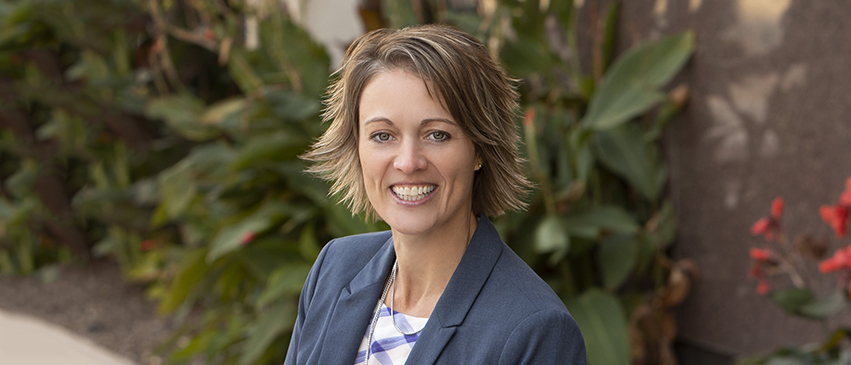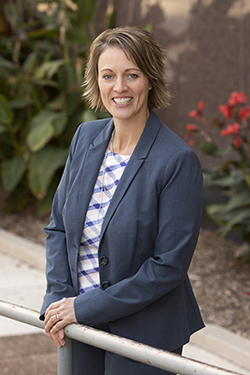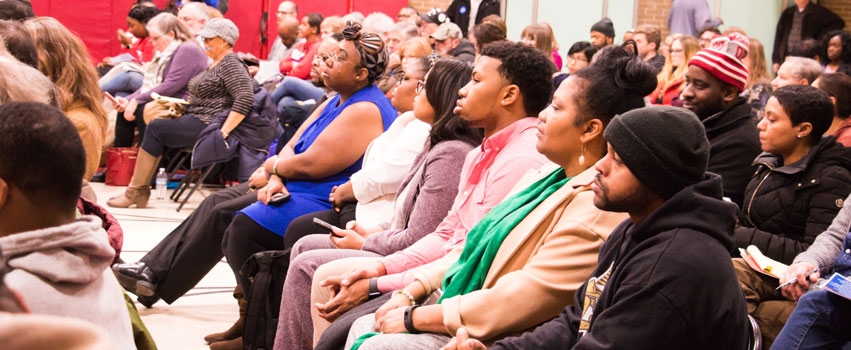Jodi Hoos

As Peoria County State’s Attorney, Jodi Hoos serves the community’s need for public safety and welfare by prosecuting criminal offenders; adjudicating cases of neglected, dependent or abused minors; helping victims through the criminal justice process; and providing legal counsel within Peoria County government. Prior to this appointment, Hoos was Peoria County resident circuit judge for five years, handling civil cases ranging from personal injury to multimillion-dollar medical malpractice claims. As assistant state’s attorney, she tried more than 150 jury trials and prosecuted nearly 50 murder cases—one of which became the basis for an episode of NBC’s Dateline. She is married with two daughters.
Where did you grow up? Who or what were early influences on you?
I grew up in a small farm community in central Nebraska, population 231. I had three older brothers who taught me all about sports and the outdoors—things I still enjoy to this day. We were a family with a lot of love, but not a lot of means. My brothers and I all had various jobs by our middle school years, including paper routes, de-tasseling corn, lawn mowing and shoveling snow. These experiences taught me the value of hard work, and that if you want something in life you have to put in the effort.
Tell us about your educational background. How and why were you first inspired to pursue a career in law?
At the tender age of 12, my dad was killed in a car accident. It took three years and a jury trial for a wrongful death claim to bring some balance back to my family, who was shattered by that tragedy. That trial, where I was called as a witness, changed my life forever. I knew standing outside that courthouse that my career would be spent inside of one.
I went on to graduate valedictorian from Amherst Public High School in 1993 as a three-sport athlete. I went to college at the University of Nebraska at Kearney, where I was a four-year starter at third base for the softball team. During those four seasons, our softball team was a combined 152-42, won three Conference titles, and reached the Division II National Championships Elite 8 in 1996 and 1997.
I graduated magna cum laude from the University of Nebraska at Kearney in 1997 with a bachelor’s degree in political science. I then went to law school at the University of Nebraska at Lincoln and received my juris doctor in 2000.
Please list and reflect upon your major accomplishments of recent years. What are you most proud of in your career?
I was very honored and humbled to be a circuit judge for five years. The time I spent on the bench will always have a special place in my heart, and that role would be near the top of my list of accomplishments. However, if I had to reflect back on my entire career and list what I am most proud of, it would be the murder trials I handled while an assistant state’s attorney for Peoria County. During my 15-year career in that position, I handled nearly 50 murder cases. On top of losing a loved one to a tragic death, most families of murder victims struggle to navigate an unfamiliar criminal justice system. Being able to lead families through that difficult process and being the voice for those who didn’t have one are things I will always be proud of.
What have been some of the biggest challenges you’ve experienced in your roles as a prosecutor, judge and state’s attorney?
One of the biggest challenges as state’s attorney has been the year 2020. I’m guessing many people can relate to that statement. This year has brought incredible challenges to most people, but as a first-year state’s attorney, I could not have imagined a bumpier ride.
Many of the biggest obstacles this year—legal questions for Peoria County with the closure of the county-owned nursing home; law enforcement issues in the wake of the COVID-19 shutdown; COVID-19 outbreaks at the Peoria County Jail in the middle of not one, but two murder jury trials; and protests and riots that filled our streets for days—had never occurred for any prior state’s attorney, so I had very little experience to draw from. It wasn’t like I could open a law book and find the answer to COVID-19.
On top of everything else, I lost my first assistant, chief of charging, and chief of juvenile to retirement. These were individuals that had nearly 100 years of combined experience. Replacing them in such a difficult year only added to the early challenges of this role. Let’s just say, like the rest of the world, I’m looking forward to 2021.
Did you have a mentor in the early stages of your career? How did this person help you along the way?
Circuit Judge Kevin Lyons. He is the reason I am in Peoria. When he was the Peoria County state’s attorney, he took a chance on this small-town girl from Nebraska and gave me my first job out of law school. I didn’t know a soul when I moved here; in fact, I had to look up Peoria on a map to find it (back when people used maps). Not only did he get me to Peoria, but he was instrumental in shaping my young legal career. He was the one who always said being a prosecutor is about doing the right thing, even if it isn’t the popular thing. As a prosecutor, those are words to live by.
What is the best piece of advice you ever received?
My mom told me a long time ago that life is like a game of cards. You never know what cards you’re going to be dealt, but you learn to play with what you have, and sometimes that means throwing your whole hand in and starting over.
What causes are near and dear to you? What are your passions?
Anything involving children. Our youth are so easily influenced. We all need to do our part to expose them to as many positive experiences as we can—especially those who are heading in the wrong direction.
What is your leadership style or philosophy?
Build others up with you.
What do you want your legacy to be?
That I always stood for what was right. PM
